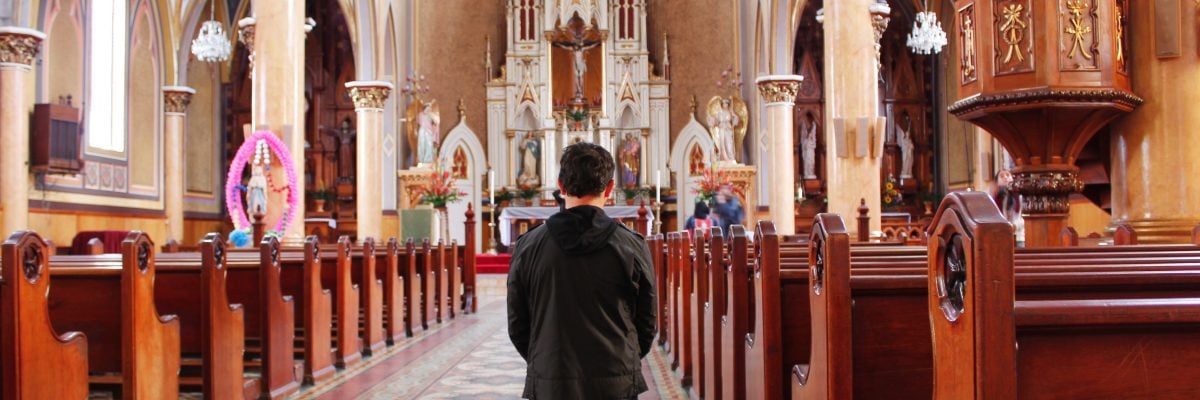
When I converted from Evangelical Protestantism to Catholicism, I made a lot of theological changes in my life. I expected this, but I didn’t expect that I would be making a lot of sociological changes, too. Every group has its own subculture, and that includes religions. Language is one of the biggest differences. How we talk about our faith, how we pray, and how we refer to God all differ. All this had to change for me when I became Catholic.
One thing I immediately noticed is the hesitation among Catholics to say the name Jesus. In my Evangelical world we referred to Jesus on a regular basis. But Catholics were different. They usually didn’t talk about Jesus directly, and even when they did they would often refer to him as “Our Lord” or “Christ.” I later found that this was a cultural tradition that originates from a reverence for the name of Jesus. In the same way you wouldn’t talk about the president by his first name, Catholics didn’t refer to the Lord by his name.
Although the intentions are good, this reticence to use the name of Jesus has its drawbacks—for the name of Jesus has power. We see this clearly in the New Testament. Consider Acts 4:5-12:
On the morrow their rulers and elders and scribes were gathered together in Jerusalem, with Annas the high priest and Caiaphas and John and Alexander, and all who were of the high-priestly family. And when they had set [Peter and John] in the midst, they inquired, “By what power or by what name did you do this?” Then Peter, filled with the Holy Spirit, said to them, “Rulers of the people and elders, if we are being examined today concerning a good deed done to a cripple, by what means this man has been healed, be it known to you all, and to all the people of Israel, that by the name of Jesus Christ of Nazareth, whom you crucified, whom God raised from the dead, by him this man is standing before you well. This is the stone which was rejected by you builders, but which has become the head of the corner. And there is salvation in no one else, for there is no other name under heaven given among men by which we must be saved.”
When arrested for healing a man, Peter and John are asked by the authorities, “By what name did you do this?” They understood that names had power, and they wanted to know what name had the power to heal. Peter boldly tells them that it is the name of Jesus that healed the man. But then Peter goes further: he tells them that salvation itself comes from this name. In fact, under no other name may one be saved. Salvation is intimately bound up with the name of Jesus.
Catholics historically have understood the great power of this name. In the Middle Ages, a great devotion to the Holy Name developed. Many Catholics embraced this devotion, but perhaps none more so than St. Bernard of Clairvaux. He tirelessly promoted the holy name of Jesus, writing,
The name of Jesus is light, and food, and medicine. It is light, when it is preached to us; it is food, when we think upon it; it is the medicine that soothes our pains when we invoke it… For when I pronounce this name, I bring before my mind the man, who, by excellence, is meek and humble of heart, benign, sober, chaste, merciful, and filled with everything that is good and holy, nay, who is the very God almighty—whose example heals me, and whose assistance strengthens me. I say all this, when I say Jesus.
Devotion to the name of Jesus can be seen in the liturgy as well. Traditionally, a priest (and altar servers) will bow when the name of Jesus is pronounced during the Mass. This demonstrates the great reverence we should have for this powerful name.
Why does this name have such power? In our modern world, we don’t think much of names. They are functional, but not much else. But in the ancient world, it was understood that a name fundamentally represented the person, and knowing a person’s name gave you some level of control over that person—the ability to call on that person. This is why, when asked by Moses for his name, God simply responds, “I am who I am” (Exod. 3:14). Unlike the pagan gods, the one true God was not at the beck and call of men. He was in total control.
Yet with the Incarnation, we see God humbling himself to take on a name. Now, in a sense, he is at our beck and call. Christ tells us, “If you ask anything in my name, I will do it” (John 14:14, emphasis added). God didn’t become a generic “man,” but a specific man: Jesus of Nazareth. By doing so, he infused the name Jesus with divine power.
The name of Jesus is intimately tied to salvation. Peter said it is the only name by which we can be saved. In fact, the name means “Yahweh is salvation.” Thus, it has a central role in evangelization. Many of us, however, avoid the name of Jesus when talking to others. We are afraid that if we drop that name too much, we’ll look like a religious nut. We’re afraid we’ll be lumped in as one of “those people.” Yet we need to reclaim the name of Jesus and use it when talking to others about Catholicism.
Using the name of Jesus reminds others of an important point: converting (or reverting) to Catholicism is not simply a matter of accepting a set of doctrines. Instead it is fundamentally about giving your life to a person, Jesus Christ. Pope Benedict XVI wrote, “Being Christian is not the result of an ethical choice or a lofty idea, but the encounter with an event, a person, which gives life a new horizon and a decisive direction.” Using the name of Jesus makes this “encounter with a person” tangible. Nothing is more personal than someone’s name.
Further, when talking with Evangelicals using the name of Jesus can have a practical effect. When you speak that name you are talking their language. I’ve noticed this when I use the name of Jesus when describing my Catholic faith. I might say, “Jesus forgave my sins in Confession,” or, “The highlight of my week is when I receive Jesus on Sunday mornings at Mass.” This isn’t what they expect of a Catholic! By making clear that I have a relationship with Jesus, Evangelicals come to see that Catholicism isn’t an alien religion consisting mostly of rules and men with funny hats. This breaks barriers for them to learn more about the Catholic faith.
Invoking the name of Jesus has power—power we can’t always see or fully understand. As St. Paul wrote, “[E]very one who calls upon the name of the Lord will be saved” (Rom. 10:13). If we desire for our loved ones to be saved, we need them to understand the power of that name. Ultimately, in fact, all peoples will acknowledge the power of the name of Jesus:
Therefore God has highly exalted him and bestowed on him the name which is above every name,that at the name of Jesus every knee should bow, in heaven and on earth and under the earth (Phil. 2:9-10, emphasis added).
Let us do our part to bring that name into every corner of our lives, so that one day all our loved ones may acknowledge—and experience—its saving power.



